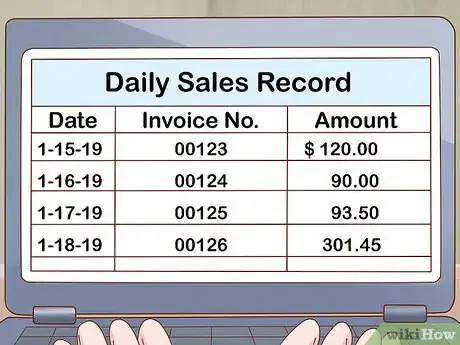This article was co-authored by Brett Baughman. Brett Baughman is a Business & Life Coach, as well as the Founder of The Brett Baughman Companies, Inc., and the renowned Action Mastery retreats. With over 20 years of experience, his specialty is helping high-performing executives and entrepreneurs to advance to the next level of success. He earned his Bachelor’s Degree from Illinois State University and was mentored by Tad James. During his work at the Tad James Company, he earned his certifications as a Master NLP Coach (Neuro-Linguistic Programming), a Certified Master Hypnotherapist, an NLP Trainer & Master Practitioner, and a Time Line Therapy Trainer & Master Practitioner. He’s also been voted the Top Coach to work with by Apple News.
This article has been viewed 79,798 times.
Beyond just being dependable, being reliable is synonymous to unerring[1] at a high level, especially important for dangerous or very impactful kinds of work. For instance, hiring an infant's babysitter requires the parents to rely on someone for the life, safety and health of their baby. Here are some suggestions about how to be highly reliable.
Steps
-
1Understand "rely" means to depend for support, help, or supply: This is as a young child relies on parents/caretakers for life, food, and everything else; it also means to place or have faith or confidence, as in "relied on them to tell him the truth."[2]
~ Understand the definition of "reliable". Reliable means may be relied upon; dependable in achievement, accuracy, honesty, as in reliable information.[3] -
2Understand that other terms may be used to convey the same denotation or connotation:[4]
~ Trusty, authentic, consistent, -- sometimes considered as infallible, -- trustworthy apply to persons, objects, ideas, or information that can be depended upon with confident certainty.
~ Reliable suggests working correctly and [at least] very consistent dependability of judgment, character, performance, or result: a reliable formula, judge, car -- and that implies that if a formula works correctly it is reliable; also, if a judge adjudicates and explains the law and is rarely, if ever, overruled then that is reliable.
~ Infallible suggests the complete absence of error, breakdown, or poor performance: an infallible test, system, marksman.
~ Trustworthiness suggests the steady and honest dependability which encourages one's confidence, belief, or trust: trustworthy and accurate reports.
Improve Skills and Abilities
-
1Work "toward" accuracy approaching perfection or reasonableness. An example could be to: proofread professionally for a large financial printer/publisher. And, since reliable is a synonym for infallible[5] , then although infallibility/perfection may not be possible -- that is a necessary goal toward which to work.
- Be relied upon by others such as a court, judge and jury. A jury is called the reasonable man when they attend to, deliberate and decide guilt or innocence, awards and punishments. Avoid the devastating failure of "unreliable" personnel being relied upon which may lead to errors, failures, crashes, possible deaths. The opposite of reliable is deceptive, irresponsible, unreliable, untrustworthy, unsure, uncertain, ie: unqualified.[6]
-
2Become fully qualified: get the best education, training and retraining. Both formal and informal education are important. All successful men self-teach, but formal education is becoming more highly regarded today, and can serve as motivation.
-
3Learn about, obtain, and use the proper and latest protective or safety gear correctly. This requires diligence and much practise. Prepare an emergency plan, and be expert in that area as well as work and play areas.
-
4Update, review, and maintain records and action plans. Planning and procedure manuals, accounting books and software or tools for productivity, computer programs and procedures in the processes of your work must be aligned or designed to fit your area of expertise.
-
5Use experts for intervention/arbitration as needed. Bring yourself and all members of a faculty, surgery team, nurse staff, training corps, secretaries and clerk assistants, sport team coaches and team skills in line. Keep them at as high a level of competency as possible, as they must be (to be reliable).
-
6Learn to be expert in using the best and the right software, instruments, or tools.
Create Mindset and Atmosphere
-
1Prioritize your load. Leave your personal anger, sadness, difficulties and feelings about illness or dysfunctional, exciting/disturbing or controlling family or friends outside. Leave emotions (yours and theirs) at home. Smile, when/if that is appropriate.
-
2Focus your concentration. Keep fun activities of family and friends from preoccupying your mind during intensive work: and so, keep it from interfering in the planning, expediting, routing, production, deadlines, setting the company or school better/best mindset, and out of the secretarial, and assistant management team and off the sport team, to be keenly aware of any ongoing processes, etc.
-
3Get enough rest to be able to be alert. So, be at the top of your game and work: relax and sleep well to be able to be at your best. Cope with the effects of jet-lag (disruption of hours of sleeping and being awake). Shift your eating and going to bed earlier a few nights before leaving -- if you're traveling east, but if you're traveling west, try eating and going to bed later for a couple of nights before departing. Stay well hydrated.
-
4Stay alert. Be sure that you are not just going through the motions, and work on having calm nerves that are able to match your designated tasks. Capacities and abilities should be honed to be confident and then relax your muscles, as desirable, and assure yourself that you are well prepared.
-
5Be mindful of good things: use a color, one word or a short phrase to spark and re-focus thinking of a successful and inspiring event, place or person. First you must have that experience and then use it to keep worrying reversed by replacing it with that image or thought.
Expert Q&A
-
QuestionHow can I be a reliable person at work?
 Brett BaughmanBrett Baughman is a Business & Life Coach, as well as the Founder of The Brett Baughman Companies, Inc., and the renowned Action Mastery retreats. With over 20 years of experience, his specialty is helping high-performing executives and entrepreneurs to advance to the next level of success. He earned his Bachelor’s Degree from Illinois State University and was mentored by Tad James. During his work at the Tad James Company, he earned his certifications as a Master NLP Coach (Neuro-Linguistic Programming), a Certified Master Hypnotherapist, an NLP Trainer & Master Practitioner, and a Time Line Therapy Trainer & Master Practitioner. He’s also been voted the Top Coach to work with by Apple News.
Brett BaughmanBrett Baughman is a Business & Life Coach, as well as the Founder of The Brett Baughman Companies, Inc., and the renowned Action Mastery retreats. With over 20 years of experience, his specialty is helping high-performing executives and entrepreneurs to advance to the next level of success. He earned his Bachelor’s Degree from Illinois State University and was mentored by Tad James. During his work at the Tad James Company, he earned his certifications as a Master NLP Coach (Neuro-Linguistic Programming), a Certified Master Hypnotherapist, an NLP Trainer & Master Practitioner, and a Time Line Therapy Trainer & Master Practitioner. He’s also been voted the Top Coach to work with by Apple News.
Life Coach Start by making a plan and getting clear on your specific goals and the path you want to take. Then, make a commitment to that plan by sharing it with someone else, like your mentor or manager. As you bring that plan into reality by committing to it and doing those steps, you'll find that your focus becomes less emotional and more objective. From there, you can focus on enhancing and refining your performance.
Start by making a plan and getting clear on your specific goals and the path you want to take. Then, make a commitment to that plan by sharing it with someone else, like your mentor or manager. As you bring that plan into reality by committing to it and doing those steps, you'll find that your focus becomes less emotional and more objective. From there, you can focus on enhancing and refining your performance.
Warnings
- Don't do any very critical task, if you are too tired or upset.⧼thumbs_response⧽
- A brain surgery team is only as good as its least qualified participant when one slip or mistake is possibly fatal or devastating.⧼thumbs_response⧽
Expert Interview

Thanks for reading our article! If you'd like to learn more about being more reliable, check out our in-depth interview with Brett Baughman.
References
- ↑ "unerring" - Roget's 21st Century Thesaurus, 3rd Ed
- ↑ Definition of "Rely", Dictionary.com Unabridged - Random House Dictionary, © Random House, Inc.
- ↑ Definition of "Reliable", Dictionary.com Unabridged - Random House Dictionary, © Random House, Inc.
- ↑ Synonym of "Reliable" - Roget's 21st Century Thesaurus, 3rd Ed
- ↑ "infallible" - Roget's 21st Century Thesaurus, 3rd Ed
- ↑ antonyms (opposite) of "reliable" - Roget's 21st Century Thesaurus, 3rd Ed








































































